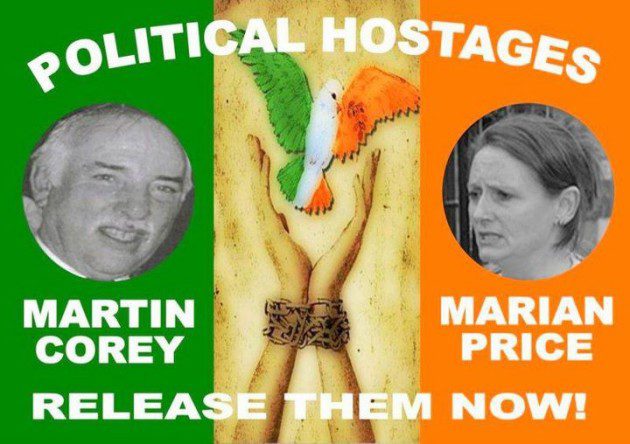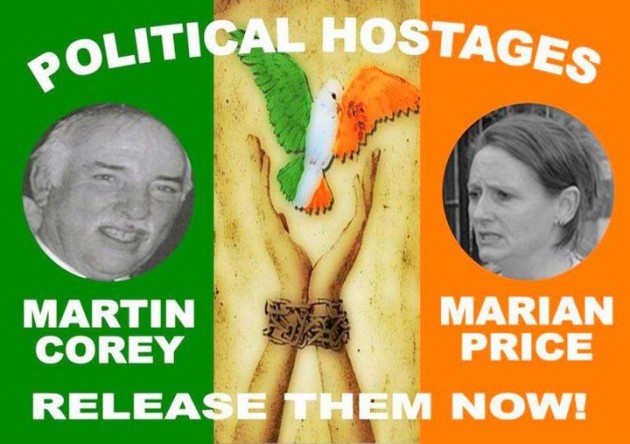Pauline Mellon, attivista per Marian Price, scrive un articolo sulle implicazioni della giustizia che sorgono dalla differenza tra le promesse dell’Accordo del Venerdì Santo e i fatti sul terreno
Quest’anno segna il 15° anniversario della firma dell’Accordo del Venerdì Santo, noto anche come l’Accordo di Belfast. Questo accordo doveva portare il cambiamento, un “nuovo inizio”.
Per me questo anniversario serve per ricordare che in quindici anni ben poco è cambiato. La disputa in corso sulla bandiera alla Belfast City Hall e la promessa di un sondaggio di confine sono la prova che, dopo 15 anni, qui nel Nord dell’Irlanda le nostre comunità sono ancora divisei.
Tuttavia la continua polarizzazione delle comunità del Nord è solo un aspetto delle carenze intrinseche dell’accordo. Non c’è la promessa Legge sui Diritti (Bill Of Rights) e adesso i muri della pace sono più di quanti fossero al momento della firma dell’accordo. Lo spettro dell’emigrazione continua a minacciare il paese. L’emigrazione è aumentata l’anno scorso del 16% rispetto ai 12 mesi precedenti, con 46.500 persone che hanno lasciato l’Irlanda.
Quando sento parlare di Accordo del Venerdì Santo, due nomi in particolare mi tornano in mente: Marian Price (59 anni) e Martin Corey (63 anni). Queste persone sono state rilasciate senza condizioni dai giudici ma ancora rimangono in carcere a causa del loro passato.
Marian Price e Martin Corey sono vittime del sistema giudiziario kafkiano che opera nel Nord dell’Irlanda. Il loro trattamento è in diretto conflitto con le tante promesse delineate nell’Accordo del Venerdì Santo ed è un esempio della continua erosione dei principi fondamentali della giustizia civile. Questo trattamento è la prova che il nostra micro governo non può essere attendibile nella tutela dei diritti di tutti i cittadini. Un micro governo che è manovrato, manipolato e meticolosamente gestito dalla Crudele Britannia. Considerando il fallimento del regime di Stormont si può vedere una correlazione diretta tra ciò che sta accadendo qui nel Nord e gli scritti di Frank Kitson.
Marian Price è detenuta per un’accusa prima decaduta e poi reintegrata e per un’accusa basata sul sentito dire di terze parti, di cui né lei né i suoi avvocati sono al corrente. Questo di per sé è un affronto alla giustizia aperta perché rimuove tutti i motivi di una contestazione legale.
L’uso continuato di prove chiuse/segrete consente al governo di giocare la carta della sicurezza nazionale e, se necessario, nascondere tutto sotto un manto di segretezza. Nel caso di Marian questo mantello di segretezza ricopre molto bene anche il Perdono Reale che ha ricevuto nel 1980. Un documento ufficiale che le autorità affermano sia andato prerduto.
Attualmente il caso di Marian è davanti alla Commissione per il Rilascio, lasciandola completamente alla loro mercé. In un tribunale chiuso prenderanno la loro decisione se restituire oppure no Marian Price alla sua famiglia. Il fatto che le sia già stata concessa la cauzione per loro è irrilevante. Ad oggi i commissari continuano a ostacolare i procedimenti e a fare ostruzionismo.
In un recente rapporto pubblicato da Rights Watch UK per quanto riguarda la situazione di Marian sollevano alcune preoccupazioni:
i Commissari per il Rilascio hanno dichiarato che non sono indipendenti dal governo, nel senso che sono nominati dal Segretario di Stato per l’Irlanda del Nord e possono essere da lui licenziati. Fanno quindi parte del braccio esecutivo dello Stato e non del braccio giudiziario dello Stato.
Questo mette in discussione l’indipendenza della magistratura. Sicuramente nell’interesse della giustizia ci dovrebbe essere separazione tra il potere giudiziario e lo Stato. In entrambi i casi, Marian Price e Martin Corey hanno ottenuto il rilascio con la condizionale ma il giudizio è stato ribaltato dal Segretario di Stato britannico.
La relazione citata si conclude con la richiesta di rilascio per Marian per motivi umanitari e afferma: “Continueremo a fare pressione per la liberazione di Marian Price e lei ha diritto a un processo equo e non deve essere trattata come una pedina politica in uno stato di eccezionalità”.
Spesso sentiamo come le cose sono cambiate e di come dobbiamo andare avanti. Come possiamo muoverci in avanti quando le persone continuano ad essere perseguitate per le loro diverse opinioni e per il loro passato. Qual è il prezzo del cambiamento?
THE PRICE OF CHANGE
Guest writer Pauline Mellon, a Marian Price campaigner, with a piece on the implications from justice that arise from the defecit between the promise of the GFA and the facts on the ground.
This year marked the 15th anniversary of the signing of the Good Friday Agreement or as it’s also known the Belfast Agreement. This agreement was to bring change, a ‘new beginning.’
For me this anniversary is a reminder that fifteen years on very little has changed. The ongoing dispute over the flag pole at Belfast City Hall and the promise of a border poll are proof that 15 years on here in the North of Ireland our communities are still polls/poles apart.
However the continued polarisation of the communities in the north is only one aspect of the intrinsic failings of the agreement. There is no promised Bill Of Rights, and there are now more peace walls than there were when the agreement was signed. The spectre of emigration still looms large over the country. Emigration was up last year 16% on the previous 12 months with 46,500 people leaving Ireland.
When I hear mention of the Good Friday Agreement two names in particular spring to mind, Marian Price (59) and Martin Corey (63). These people have been bailed unconditionally by the courts yet remain incarcerated for their past.
Marian Price and Martin Corey are victims of the Kafkaesque justice system operating in the North of Ireland. Their treatment is in direct conflict with the many promises outlined in the Good Friday Agreement and an example of the continued erosion of the core principals of civil justice. This treatment is proof that our micro government cannot be trusted to protect the rights of all. A micro government which is manoeuvred, manipulated and meticulously managed by Cruel Britannia. Considering the failing of the Stormont regime one can see a direct correlation between what’s happening here in the north and the writings of Frank Kitson.
Marian Price is held on a charge that was dismissed and then later reinstated and a charge based on third party hearsay evidence that neither she nor her legal team are privy to. This in itself is an affront to open justice as it removes all grounds for legal challenge.
The continued use of closed/secret evidence enables the government to play the national security card and when necessary drape a blanket of secrecy over wrong doing. In Marian’s case this blanket among other things may be well and truly draped over the the Royal Pardon she received in 1980, a pardon the authorities claim is missing.
At present Marian’s case is front of the Northern Ireland Parole Commission leaving her entirely at their mercy. They in a closed court will make their decision on whether or not Marian Price (59) should be returned to her family. The fact she has already been granted bail to them is irrelevant. To date the commissioners continue to stymie and stonewall proceedings .
In a recent report published by ‘Rights Watch UK’ in respect of Marian’s situation they raise concerns at how:
the Parole Commissioners for Northern Ireland have themselves stated that they are not independent from the government in that they are appointed by the Secretary of State for Northern Ireland and can be dismissed by him. They are therefore part of the executive arm of the state and not the judicial arm of the state.
This calls into question the independence of the judiciary. Surely in the interest of justice there should be separation between the judiciary and state. What further compounds this is that in the cases of both Marian Price and Martin Corey they were granted bail yet the judiciary were overruled by the British secretary of state.
The report cited above concludes with calling for Marian’s release on compassionate grounds and states ‘We continue to press for the release of Marian Price and she be afforded the right to a fair trial and not treated as a political pawn in a state of exceptionalism.’
We often hear how things have changed and how we need to moved on. How do we move on when people continue to be persecuted for their opposing opinion and past. What is the price of change?

